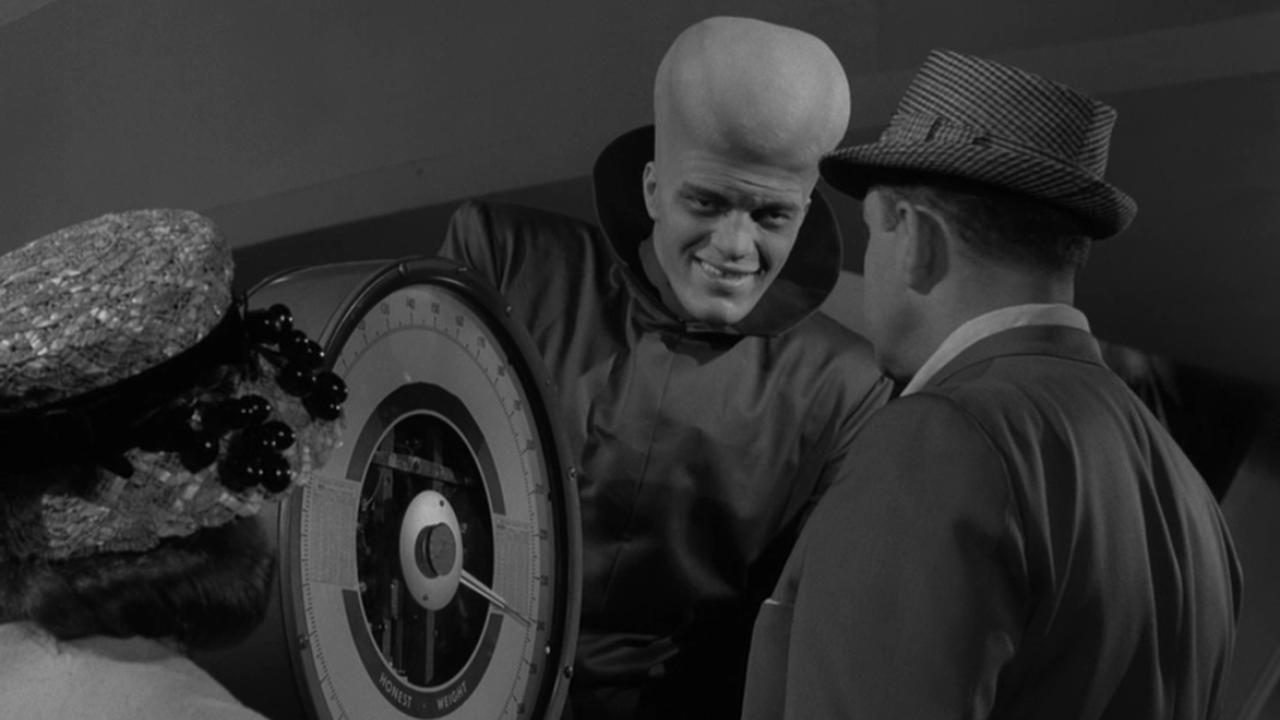Imagine a world where aliens arrive, promising peace and prosperity. They offer advanced technology, solutions to our problems, and even a mysterious, beautiful book titled “To Serve Man.” The world rejoices, embracing the arrival of these benevolent beings. But what if the book wasn’t a gift, but a cookbook? This chilling possibility is the heart of the iconic Twilight Zone episode “To Serve Man.”

Image: www.filmaffinity.com
The episode, penned by the brilliant Rod Serling, delves into the terrifying prospect of trusting the unknown, especially when it arrives with a seemingly friendly face. “To Serve Man” isn’t just a science fiction story; it’s a powerful allegory highlighting the dangers of blind faith and the importance of critical thinking in an increasingly interconnected world.
Unmasking the “Benefactors”
The episode begins with the arrival of the Kanamit, a race of bipedal aliens who speak through a translator device. Their arrival is met with widespread joy; they offer technological advancements, solve global hunger, and share “To Serve Man,” a book they claim to be a guide to creating a better future for humanity.
But amidst the celebration, a lone dissenter, a skeptical government analyst named Michael Chambers, begins to notice discrepancies. He sees the Kanamit’s actions as insincere, their promises as hollow, and the “help” they offer suspiciously convenient. His colleagues dismiss him as paranoid; the world is too enthusiastically embracing the Kanamit for anyone to listen to his doubts.
The Chilling Truth of “To Serve Man”
Chambers’ suspicions are validated when he finally deciphers the truth behind “To Serve Man.” The book, translated into English by a young linguist, turns out to be a cookbook. The Kanamit have been “serving man” in a very literal way – as a source of ingredients. The episode climaxes with a heart-wrenching scene where Chambers, now trapped in a Kanamit ship, learns of his impending fate.
The horrific truth of “To Serve Man” leaves viewers with a lingering sense of unease. The episode serves as a stark reminder that appearances can be deceiving, and our desire for a utopian solution can often blind us to the dangers lurking beneath the surface.
Beyond the Twilight Zone: The Power of Skepticism in a World of Information Overload
“To Serve Man” is more than a chilling science fiction episode. It’s a poignant reflection of our own anxieties in a world saturated with information, driven by technology, and filled with unfamiliar voices vying for our attention. Just as in the episode, we are constantly bombarded with promises of a better future, of progress, of salvation. But how do we discern genuine progress from manufactured hope? How do we separate genuine solutions from manipulative narratives?
Today, we are facing a new kind of “Kanamit” – an endless stream of misinformation, disinformation, and propaganda disguised as truth. We are bombarded with seductive narratives, charismatic personalities, and “solutions” that promise a better world. But like Chambers, we must learn to discern the truth from the illusion, to question the narrative, even if it’s uncomfortable.

Image: www.pinterest.com
The Lesson of “To Serve Man”: A Call for Vigilance
“To Serve Man” teaches us a vital lesson: we must be wary of those who promise too much, especially when the reward comes with strings attached. Critical thinking, skepticism, and a healthy dose of cynicism are essential tools for navigating an increasingly complex world. We must be vigilant, asking the hard questions, examining the narrative with an objective lens, and trusting our own instincts.
Just as Michael Chambers was a voice in the wilderness, we must embrace the uncomfortable role of the sceptic, the critic, the doubter. We must be willing to question, to challenge, and to push back against the tide of “To Serve Man,” lest we find ourselves on the menu.
The Twilight Zone – To Serve Man
The Legacy of “To Serve Man” : A Warning for the Future
Even though “To Serve Man” is a science-fiction story, its message remains relevant today. The episode’s enduring power lies in its ability to tap into our deepest fears, our innate anxieties about the unknown, and our desire for a simple, easy solution. In a world increasingly dominated by technology and complex information, we must learn to be vigilant, to protect ourselves from those who seek to “serve us” in ways we never intended.
Ultimately, “To Serve Man” is a reminder of the importance of critical thinking, an essential tool not just in the face of alien invasions, but in the ever-changing, often uncertain, world we live in. It is a story about trust, about doubt, and about the importance of asking the hard questions, even when it’s uncomfortable. It is a reminder that even in the face of hope, we must remain vigilant, lest we find ourselves served, not as guests, but as ingredients.





